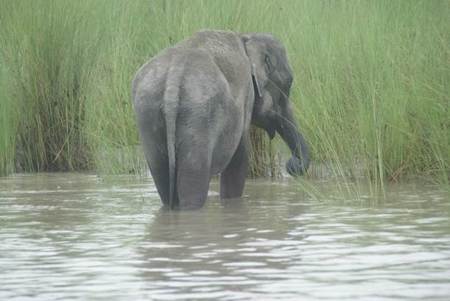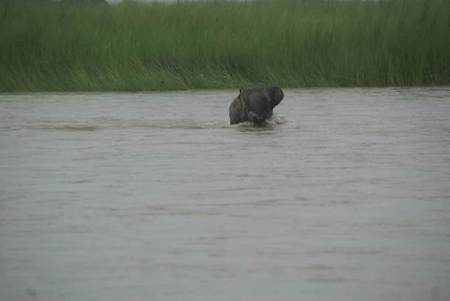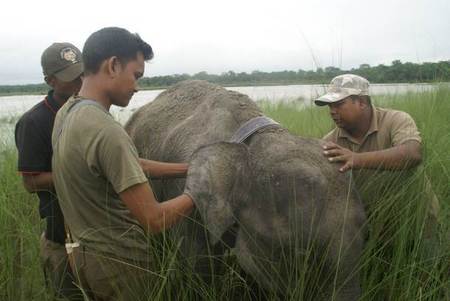Not easy finding an elephant family in the wild
August 8, 2014: It’s been nearly four months that our elephant calves have been at Manas National Park. They were five of them – including one, Philip, who was moved a week or so after the others.
All of these calves are doing well, and are still fervently looking for wild herds to take them in. However, it’s not an easy job finding a family!
Here’s an account by our field biologist Anjan Sangma of a recent incident where two of them had to be re-rescued:
It’s been raining hard over the last fortnight, and getting increasingly difficult for us to track the five elephant calves.
Of the five calves, three – Jakhala, Rani and Diphloo have been on their own and have been sighted or their signal received through the month from different parts of Manas.
Philip and Tora however have been moving about together. On the 19th of last month, they were sighted on an island in Beki River by forest guards. We received information for three consecutive days that they were in the island.
However, by the 23rd, it had become evident that they were not there by choice, they were trapped due to the rising water levels.
With our keepers looking on, Philip took the plunge, literally. He jumped into the water and clambered across into the Sundari camp, south of Beki river, and saved himself.
Tora meanwhile was still on the island. It was a worrying situation, as the incessant rains continued to raise the water levels of the river gradually drowning the island.
The next day, we hired a boat and crossed over to check on Tora to see if she was physically fit to attempt to navigate across the river. To our relief, it turned out that she was fine, but just not as bold as Philip. We tried for the next two days to cross the river, but in vain.
By then, the water level was dangerously high and we had to get her out of there.
A team of around 20 people – Forest Department staff including former IFAW-WTI veterinarian Dr. Prabhat Basumatary, local villagers, and our own IFAW-WTI team, were involved in her second ‘rescue’ on the 26th. The team surveyed around the island and found the stretch with slowest water current we could find.
We guided Tora to the area and tied a rope around her body, and successfully got her to cross the river, tugging at her from the other side on a motorboat.
We kept both the elephants for the night, changed their radio-collars for longer monitoring, and let them off into the wild again.
A wild herd was nearby, raising our hopes. Could this be the historic moment that they find a new family? We could not but be hopeful, as we do whenever calves hand-reared by our team interact with wild elephants.
But this was not to be, not this time at least. An arrogant member of the herd was not interested, and drove them back. However, not losing hope, our two elephants, followed the herd and disappeared into the forest.
Dr. Bhaskar Choudhury, our Regional Head for Northeast India, doesn’t rule out the possibility of a wild herd pushing these two towards the boundary of the park.
“Their strategy for survival and successful adaptation to this environment will take a few years of experimentation, of trial and error. However, we are hopeful that like others, these two will make it and join a herd. Our monitoring as well as interventions (whenever required and possible, as this one) will continue to ensure their survival,” he said.











